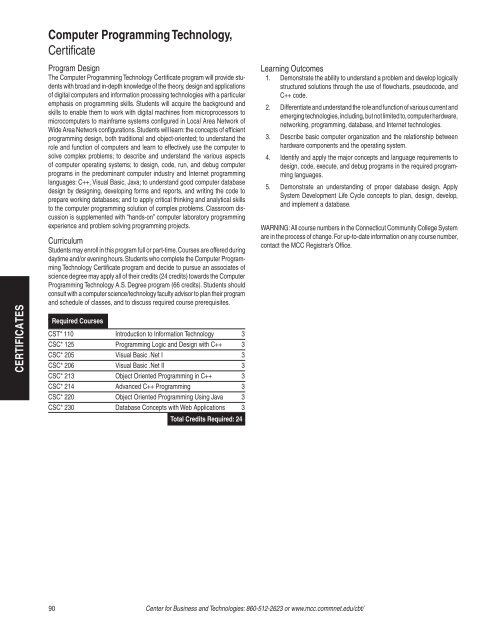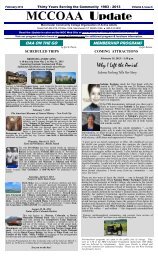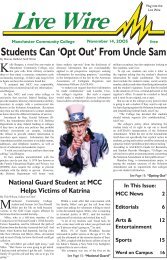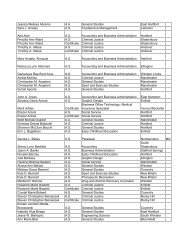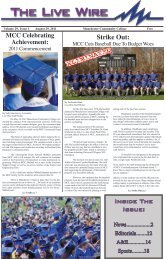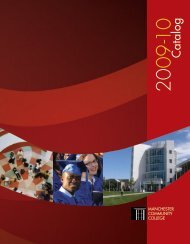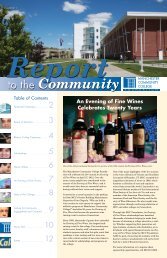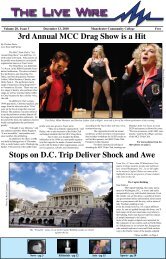Liberal Arts and Science - Manchester Community College ...
Liberal Arts and Science - Manchester Community College ...
Liberal Arts and Science - Manchester Community College ...
Create successful ePaper yourself
Turn your PDF publications into a flip-book with our unique Google optimized e-Paper software.
CERTIFICATES<br />
Computer Programming Technology,<br />
Certificate<br />
Program Design<br />
The Computer Programming Technology Certificate program will provide students<br />
with broad <strong>and</strong> in-depth knowledge of the theory, design <strong>and</strong> applications<br />
of digital computers <strong>and</strong> information processing technologies with a particular<br />
emphasis on programming skills. Students will acquire the background <strong>and</strong><br />
skills to enable them to work with digital machines from microprocessors to<br />
microcomputers to mainframe systems configured in Local Area Network of<br />
Wide Area Network configurations. Students will learn: the concepts of efficient<br />
programming design, both traditional <strong>and</strong> object-oriented; to underst<strong>and</strong> the<br />
role <strong>and</strong> function of computers <strong>and</strong> learn to effectively use the computer to<br />
solve complex problems; to describe <strong>and</strong> underst<strong>and</strong> the various aspects<br />
of computer operating systems; to design, code, run, <strong>and</strong> debug computer<br />
programs in the predominant computer industry <strong>and</strong> Internet programming<br />
languages: C++, Visual Basic, Java; to underst<strong>and</strong> good computer database<br />
design by designing, developing forms <strong>and</strong> reports, <strong>and</strong> writing the code to<br />
prepare working databases; <strong>and</strong> to apply critical thinking <strong>and</strong> analytical skills<br />
to the computer programming solution of complex problems. Classroom discussion<br />
is supplemented with “h<strong>and</strong>s-on” computer laboratory programming<br />
experience <strong>and</strong> problem solving programming projects.<br />
Curriculum<br />
Students may enroll in this program full or part-time. Courses are offered during<br />
daytime <strong>and</strong>/or evening hours. Students who complete the Computer Programming<br />
Technology Certificate program <strong>and</strong> decide to pursue an associates of<br />
science degree may apply all of their credits (24 credits) towards the Computer<br />
Programming Technology A.S. Degree program (66 credits). Students should<br />
consult with a computer science/technology faculty advisor to plan their program<br />
<strong>and</strong> schedule of classes, <strong>and</strong> to discuss required course prerequisites.<br />
Required Courses<br />
CST* 110 Introduction to Information Technology 3<br />
CSC* 125 Programming Logic <strong>and</strong> Design with C++ 3<br />
CSC* 205 Visual Basic .Net I 3<br />
CSC* 206 Visual Basic .Net II 3<br />
CSC* 213 Object Oriented Programming in C++ 3<br />
CSC* 214 Advanced C++ Programming 3<br />
CSC* 220 Object Oriented Programming Using Java 3<br />
CSC* 230 Database Concepts with Web Applications 3<br />
90<br />
Total Credits Required: 24<br />
Learning Outcomes<br />
1. Demonstrate the ability to underst<strong>and</strong> a problem <strong>and</strong> develop logically<br />
structured solutions through the use of flowcharts, pseudocode, <strong>and</strong><br />
C++ code.<br />
2. Differentiate <strong>and</strong> underst<strong>and</strong> the role <strong>and</strong> function of various current <strong>and</strong><br />
emerging technologies, including, but not limited to, computer hardware,<br />
networking, programming, database, <strong>and</strong> Internet technologies.<br />
3. Describe basic computer organization <strong>and</strong> the relationship between<br />
hardware components <strong>and</strong> the operating system.<br />
4. Identify <strong>and</strong> apply the major concepts <strong>and</strong> language requirements to<br />
design, code, execute, <strong>and</strong> debug programs in the required programming<br />
languages.<br />
5. Demonstrate an underst<strong>and</strong>ing of proper database design. Apply<br />
System Development Life Cycle concepts to plan, design, develop,<br />
<strong>and</strong> implement a database.<br />
WARNING: All course numbers in the Connecticut <strong>Community</strong> <strong>College</strong> System<br />
are in the process of change. For up-to-date information on any course number,<br />
contact the MCC Registrar’s Office.<br />
Center for Business <strong>and</strong> Technologies: 860-512-2623 or www.mcc.commnet.edu/cbt/


